Only Henry can sign off on Haiti’s transitional council, embattled PM’s office tells CNN
- Oops!Something went wrong.Please try again later.
- Oops!Something went wrong.Please try again later.
Haiti’s embattled Prime Minister Ariel Henry says his country’s constitution states that only he and his cabinet can appoint a council for the transition of power, Henry’s office told CNN exclusively on Wednesday.
After a meeting of regional Caribbean leaders on Monday, Henry agreed to leave power once a transitional council had been set up to lay the foundations for future elections, following weeks of violence in Haiti where social order has all but collapsed.
But Henry’s office told CNN that only he and his cabinet can appoint the transitional council and will not simply “deliver the country” to new leaders without following constitutional procedures.
“According to the Haitian constitution, only the prime minister with the cabinet can appoint the presenting council. Yes, the PM expresses his patriotic intentions to resign with his cabinet, but we have to do this in order,” special adviser to Prime Minister Ariel Henry, Jean Junior Joseph, told CNN.
“We will not deliver the country to just a group of people without following the procedure. We are in crisis as a country, but we must stay inside of the law and set a good example,” he added.
Henry’s office said Article 149 of Haiti’s constitution states that once the president is not available, only the ministerial cabinet possesses powers to make decisions in his absence.
“The council will have to go through the same process he went through when Ariel Henry became PM,” the statement said.

The United Nations secretary-general’s spokesperson Stephane Dujarric said Wednesday that the transitional council under the CARICOM agreement for Haiti is the path forward.
When asked if the announcement weakens Haiti’s political transition towards elections, Dujarric said, “It’s not for the secretary-general or for the UN to impose a solution on the people of Haiti. As we’ve seen that’s been tried many times without great success.”
Henry came to power unelected in 2021 following the assassination of Haiti’s then-President Jovenel Moïse. His premiership has been marred by months of spiraling gang violence, which grew more intense after he failed to hold elections last month, saying the country’s insecurity would compromise the vote.
His decision only further enraged protesters who had for months demanded he stand down as Haiti slid further into poverty and unchecked chaos.
When the worst of the violence erupted at the start of March, Henry was in Kenya to sign an agreement to send 1,000 Kenyan police officers to Haiti to restore the security situation. Their deployment was postponed Tuesday following Henry’s announcement of his resignation.
After Monday’s meeting of the Caribbean Community and Common Market (CARICOM), Henry agreed that a transitional council would be established and endowed with some powers of the presidency – including the ability to name a new interim prime minister. The resulting government would be expected to eventually hold elections in the country for a complete political reset, although it is unclear how long this would take.
Jimmy “Barbecue” Cherizier, the leader of the alliance of gangs known as Viv Ansanm (“living together”), warned Monday that his group would not recognize any government resulting from the CARICOM agreement.
The agreement was struck while Henry was in the US territory of Puerto Rico, where he arrived last week. While Henry was out of the country, gangs laid siege to Haiti’s main airport to prevent his safe return.
Amid the chaos, the neighboring Dominican Republic has remained the only country to continue deporting people back into Haiti, according to new data from the International Organization for Migration (IOM), which tracks migration flows around the world.
In the month of March, the Dominican Republic – which shares the island of Hispaniola with Haiti - deported 4,151 people to its neighbor, per IOM figures. The majority of the people deported into Haiti were men, along with 716 women, 45 boys and 55 girls.
The IOM data shows no apparent reaction from Dominican authorities to worsening conditions on the ground, with 640 Haitians deported on March 4, the day after Haiti declared a state of emergency.
Asked to comment on the Dominican Republic’s recent deportations, Dujarric said the UN was against the “forced mass displacement of people back into a country that is clearly not safe.”
The UN’s office in Haiti said it is establishing an air bridge between Haiti and the Dominican Republic to facilitate the movement of UN staff and humanitarian assistance. The air bridge will facilitate the temporary relocation of some UN staff outside Haiti and will facilitate the arrival of crisis management personnel into the country, BINUH said.
Meanwhile, aid is tricking into the country. A major Haitian port terminal, which was breached by looters and protesters last week, came back under government control on Monday.
The World Food Program (WFP) said it carried out its first maritime aid operation since late February out of Port-au-Prince to the south of Haiti on Monday, according to a post on X on Tuesday by its Haiti director Jean-Martin Bauer. The WFP transferred eight trucks carrying medical items by ferry which will be distributed to 80 health facilities, according to Bauer.
Food and other aid previously couldn’t enter the Haitian capital by sea due to the interruption of maritime ports, Bauer explained.
For more CNN news and newsletters create an account at CNN.com

